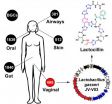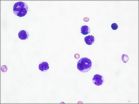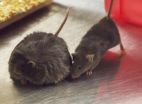(Press-News.org) Mice treated with antibiotics to remove most of their intestinal bacteria or raised under sterile conditions have impaired antibody responses to seasonal influenza vaccination, researchers have found.
The findings suggest that antibiotic treatment before or during vaccination may impair responses to certain vaccines in humans. The results may also help to explain why immunity induced by some vaccines varies in different parts of the world.
In a study to be published in Immunity, Bali Pulendran, PhD, and colleagues at Emory University demonstrate a dependency on gut bacteria for strong immune responses to the seasonal flu and inactivated polio vaccines.
Antibody responses to vaccines containing immune stimulating substances called adjuvants were not affected by a lack of gut bacteria. For example, bacteria were not critical for responses to the Tdap (Tetanus-Diphtheria-Pertussis) vaccine.
"Our results suggest that the gut microbiome may be exerting a powerful effect on immunity to vaccination in humans, even immunity induced by a vaccine that is given at a distant site," says Pulendran, Charles Howard Candler professor of pathology and laboratory medicine at Emory University School of Medicine and Yerkes National Primate Research Center.
The first author of the paper is postdoctoral fellow Jason Oh, PhD. Collaborators including Andrew Gewirtz, PhD, at Georgia State University and Balfour Sartor, MD, at the University of North Carolina contributed to the paper.
Pulendran says the impetus for this study was a previous study involving an analysis of the immune response to influenza vaccination in humans, using the "systems vaccinology" approach that his lab had pioneered. He and his colleagues had observed that in humans given the flu vaccine, the expression of the gene encoding TLR5, a few days after vaccination was correlated with strong antibody responses weeks later. TLR5 encodes a protein that enables immune cells to sense flagellin, the main structural protein for the whips (flagella) many bacteria use to propel themselves.
The ability of immune cells to sense flagellin appears to be the critical component affecting vaccine responses, the researchers found. Mice lacking TLR5 – but still colonized with bacteria -- have diminished responses to flu vaccines, similar to antibiotic-treated or germ-free mice. Oral reconstitution of antibiotic treated mice with bacteria containing flagellin, but not with mutant bacteria lacking flagellin, could restore the diminished antibody response.
"These results demonstrate an important role for gut bacteria in shaping immunity to vaccination, and raise the possibility that the microbiome could be harnessed to modulate vaccine efficacy," says Pulendran. "The key question is the extent to which this impacts protective immunity in humans."
Pulendran says that his team is planning a study in humans to address this issue.
INFORMATION: END
Intestinal bacteria needed for strong flu vaccine responses in mice
Finding grows out of human flu vaccine 'systems biology' study
2014-09-11
ELSE PRESS RELEASES FROM THIS DATE:
Our microbes are a rich source of drugs, UCSF researchers discover
2014-09-11
Bacteria that normally live in and upon us have genetic blueprints that enable them to make thousands of molecules that act like drugs, and some of these molecules might serve as the basis for new human therapeutics, according to UC San Francisco researchers who report their new discoveries in the September 11, 2014 issue of Cell.
The scientists purified and solved the structure of one of the molecules they identified, an antibiotic they named lactocillin, which is made by a common bacterial species, Lactobacillus gasseri, found in the microbial community within the vagina. ...
Cells put off protein production during times of stress
2014-09-11
DURHAM, N.C. -- Living cells are like miniature factories, responsible for the production of more than 25,000 different proteins with very specific 3-D shapes. And just as an overwhelmed assembly line can begin making mistakes, a stressed cell can end up producing misshapen proteins that are unfolded or misfolded.
Now Duke University researchers in North Carolina and Singapore have shown that the cell recognizes the buildup of these misfolded proteins and responds by reshuffling its workload, much like a stressed out employee might temporarily move papers from an overflowing ...
A non-toxic strategy to treat leukemia
2014-09-11
A study comparing how blood stem cells and leukemia cells consume nutrients found that cancer cells are far less tolerant to shifts in their energy supply than their normal counterparts. The results suggest that there could be ways to target leukemia metabolism so that cancer cells die but other cell types are undisturbed.
Harvard Stem Cell Institute scientists at the Massachusetts General Hospital Center for Regenerative Medicine and the Harvard University Department of Stem Cell and Regenerative Biology led the work, published in the journal Cell, in collaboration with ...
Scientists discover neurochemical imbalance in schizophrenia
2014-09-11
Using human induced pluripotent stem cells (hiPSCs), researchers at Skaggs School of Pharmacy and Pharmaceutical Sciences at University of California, San Diego have discovered that neurons from patients with schizophrenia secrete higher amounts of three neurotransmitters broadly implicated in a range of psychiatric disorders.
The findings, reported online Sept. 11 in Stem Cell Reports, represent an important step toward understanding the chemical basis for schizophrenia, a chronic, severe and disabling brain disorder that affects an estimated one in 100 persons at some ...
Diverse gut bacteria associated with favorable ratio of estrogen metabolites
2014-09-11
Washington, DC—Postmenopausal women with diverse gut bacteria exhibit a more favorable ratio of estrogen metabolites, which is associated with reduced risk for breast cancer, compared to women with less microbial variation, according to a new study published in the Endocrine Society's Journal of Clinical Endocrinology & Metabolism (JCEM).
Since the 1970s, it has been known that in addition to supporting digestion, the intestinal bacteria that make up the gut microbiome influence how women's bodies process estrogen, the primary female sex hormone. The colonies of bacteria ...
Puerto Ricans who inject drugs among Latinos at highest risk of contracting HIV
2014-09-11
Higher HIV risk behaviors and prevalence have been reported among Puerto Rican people who inject drugs (PRPWID) since early in the HIV epidemic. Now that HIV prevention and treatment advances have reduced HIV among PWID in the US, researchers from New York University's Center for Drug Use and HIV Research (CDUHR) examined HIV-related data for PRPWID in Puerto Rico (PR) and Northeastern US (NE) to assess whether disparities among PRPWID continue.
The study, "Addressing the HIV/AIDS epidemic among Puerto Rican people who inject drugs: the Need for a Multi-Region Approach," ...
Chemical signals in the brain help guide risky decisions
2014-09-11
A gambler's decision to stay or fold in a game of cards could be influenced by a chemical in the brain, suggests new research from the University of British Columbia.
The rise and fall of dopamine plays a key role in decisions involving risk and reward, from a baseball player trying to steal a base to an investor buying or selling a stock. Previous studies have shown that dopamine signals increase when risky choices pay off.
"Our brains are constantly updating how we calculate risk and reward based on previous experiences, keeping an internal score of wins and losses," ...
Mice and men share a diabetes gene
2014-09-11
A joint work by EPFL, ETH Zürich and the CHUV has identified a pathological process that takes place in both mice and humans towards one of the most common diseases that people face in the industrialized world: type 2 diabetes.
This work was conducted in Johan Auwerx's (EPFL) and Ruedi Aebersold's (ETH Zürich) laboratories, and succeeded thanks to the combination of each team's strengths. The relevance of their discovery, published today in Cell Metabolism, results from their joint effort.
In Lausanne, the researchers carried out a detailed study of the genome and ...
Compound protects brain cells after traumatic brain injury
2014-09-11
A new class of compounds has now been shown to protect brain cells from the type of damage caused by blast-mediated traumatic brain injury (TBI). Mice that were treated with these compounds 24-36 hours after experiencing TBI from a blast injury were protected from the harmful effects of TBI, including problems with learning, memory, and movement.
Traumatic brain injury caused by blast injury has emerged as a common health problem among U.S. servicemen and women, with an estimated 10 to 20 percent of the more than 2 million U.S. soldiers deployed in Iraq or Afghanistan ...
Proactive monitoring of inflammatory bowel disease therapy could prolong effectiveness
2014-09-11
BOSTON – Proactive monitoring and dose adjustment of infliximab, a medication commonly used to treat inflammatory bowel disease (IBD), could improve a patient's chances of having a long-term successful response to therapy, a pilot observational study at Beth Israel Deaconess Medical Center concludes.
The study, published in the Inflammatory Bowel Diseases, evaluated the levels of infliximab, an antibody designed to bind to and block the effects of TNF-alpha, an inflammatory protein found in high levels in patients with IBD, such as Crohn's disease and ulcerative colitis, ...
LAST 30 PRESS RELEASES:
Urban trees can absorb more CO₂ than cars emit during summer
Fund for Science and Technology awards $15 million to Scripps Oceanography
New NIH grant advances Lupus protein research
New farm-scale biochar system could cut agricultural emissions by 75 percent while removing carbon from the atmosphere
From herbal waste to high performance clean water material: Turning traditional medicine residues into powerful biochar
New sulfur-iron biochar shows powerful ability to lock up arsenic and cadmium in contaminated soils
AI-driven chart review accurately identifies potential rare disease trial participants in new study
Paleontologist Stephen Chester and colleagues reveal new clues about early primate evolution
UF research finds a gentler way to treat aggressive gum disease
Strong alcohol policy could reduce cancer in Canada
Air pollution from wildfires linked to higher rate of stroke
Tiny flows, big insights: microfluidics system boosts super-resolution microscopy
Pennington Biomedical researcher publishes editorial in leading American Heart Association journal
New tool reveals the secrets of HIV-infected cells
HMH scientists calculate breathing-brain wave rhythms in deepest sleep
Electron microscopy shows ‘mouse bite’ defects in semiconductors
Ochsner Children's CEO joins Make-A-Wish Board
Research spotlight: Exploring the neural basis of visual imagination
Wildlife imaging shows that AI models aren’t as smart as we think
Prolonged drought linked to instability in key nitrogen-cycling microbes in Connecticut salt marsh
Self-cleaning fuel cells? Researchers reveal steam-powered fix for ‘sulfur poisoning’
Bacteria found in mouth and gut may help protect against severe peanut allergic reactions
Ultra-processed foods in preschool years associated with behavioural difficulties in childhood
A fanged frog long thought to be one species is revealing itself to be several
Weill Cornell Medicine selected for Prostate Cancer Foundation Challenge Award
Largest high-precision 3D facial database built in China, enabling more lifelike digital humans
SwRI upgrades facilities to expand subsurface safety valve testing to new application
Iron deficiency blocks the growth of young pancreatic cells
Selective forest thinning in the eastern Cascades supports both snowpack and wildfire resilience
A sea of light: HETDEX astronomers reveal hidden structures in the young universe
[Press-News.org] Intestinal bacteria needed for strong flu vaccine responses in miceFinding grows out of human flu vaccine 'systems biology' study





